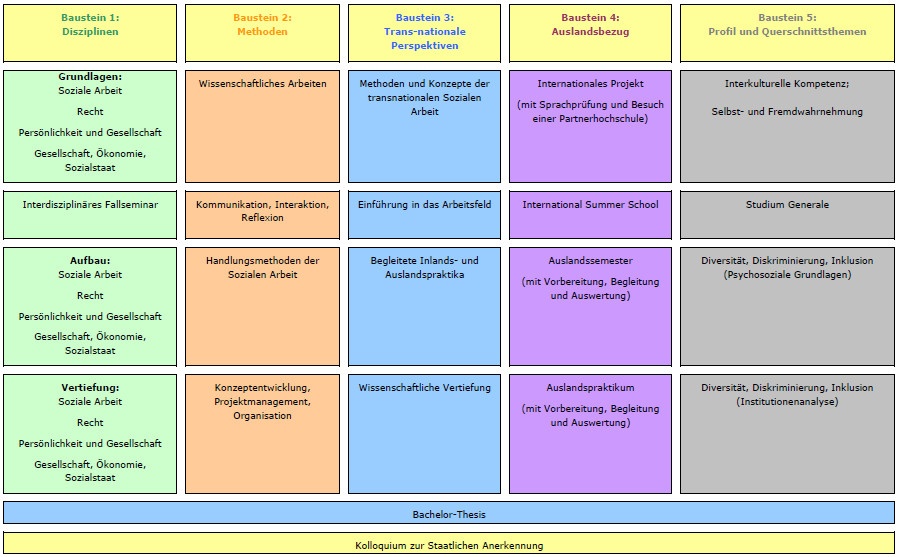Are you interested in Social Work in an international context? Are you interested in studying and working abroad? Do you already have experience in the social field? Do you have good English skills? Then please fill out the admission requirements for the degree course Social Work :transnational (B.A.). The degree course is based on the bachelor degree course Social Work, it further integrates however two stay abroad and an additional practical phase.
Summary
Program | Social Work :transnational |
Terms | 8 semesters, full-time |
ECTS credit points | 240 |
Program start | Summer and winter semester |
Application deadlines | Summer semester: Jan 15 |
Languages | German, English |
Accreditation | by AHPGS e.V. |
The degree course Social Work :transnational prepares the students for the above-mentioned extremely diverse work requirements by providing a generally-oriented course of study and with a focus on international and transnational topics at the same time, which offers the introduction into a chosen field of work of social work without limiting the deployment of the graduates to this particular field. Graduates of the degree course Social Work :transnational have a critical understanding of theories, principles and methods of social work and are able to deepen their knowledge independently. Furthermore, they are able to apply this knowledge and understanding in their actions and find solutions and arguments, develop professional positions, justify them with arguments and further develop them, as well as exchange interdisciplinary, international and intercultural ideas.
The bachelor degree course Social Work :transnational further expands the curriculum of the bachelor degree course "Social Work" by an integrated semester abroad (module 22) as well as the integrated, accompanying internship abroad (module 25).
Transnational means that this Bachelor degree course entails cultural similarities (and differences), the consequences of global communication and political interdependencies and includes everyday life practice at different locations, as well as social problems, societal structures and regulations, which go beyond the borders of national states. Examples are for instance the use of natural resources, the uneven distribution of wealth, the consequences of conflicts, wars and poverty as well as flight, migration and mobility.
Regular period of study in the degree course Social Work :transnational is 8 semesters full-time (240 credits, 7,200 hours). A semester abroad is planned in the 4th semester at a European partner university (30 credits, 900 hours). Furthermore, two practical phases are incorporated into the studies: an accompanying internship within Germany in the sixth semester (20 credits, 600 hours) and an accompanying internship abroad during the 8th semester (30 credits, 900 hours).
The degree course is structured in a way so that meaningful, successive increase of knowledge and increase of competence will be assured.
Study content
The course of study entails five modules:
- the scientific disciplines Social Work, legal, social sciences (module 1) 1,
- the method formation (module 2),
- Focus in the area of transnational Social Work (module 3)
- the integrated and accompanies phases abroad (module 4) as well as
- the conveyance of interdisciplinary intercultural and diversity competences (module 5).
Contextually graduates will be able to understand, analyze and develop based on that theoretically derived and scientifically based solution approaches of social (European and global) problems (such as for instance unemployment, poverty, migration, multi-ethnicity, violence and crime) – in a comparing perspective. Furthermore, the students will be able to find and further develop solutions to a problem learnt during the internship abroad.
You will learn how toprove yourself in a new, unfamiliar, country speaking another language, where you are confronted with diversity, (cultural) foreign cultural experiences and the requirement of social integration (of oneself). You will be able to reflect such experiences and incorporate them into social work and in interdisciplinary and international contexts. You will be able to move in other social, cultural and economic contexts and to have respect and appreciation for this life.
The professional added value is in the own, experiences and their reflections and an understanding for foreign experience contexts and their empathic accompaniment which is of particular importance in Social Work. This promotes the removal of cultural barriers and the development of intercultural competencies in graduates.
Deadlines
The exclusion deadline for the receipt of the admission application ends on January 15, for the summer semester and on July 15, for the winter semester.
You must apply separately and formless for the random selection.
Admission restrictions
The degree course is admission restricted, the study place allocation takes place via a local NC-procedure.
Additional information
(1) The following admission requirements are determined for the bachelor degree course Social Work :transnational:
a) Knowledge of the English language at level B1, through the presentation of school certificates (4 years) or results of language tests (i.e. IELTS, TOEFLS, Cambridge etc.) or higher education entrance qualifications from an English-speaking country or proof of a respective citizenship.
b) Proof of professional experience through presentation of voluntary service in accordance with § 11 Federal Voluntary Service Law or a final certificate of a secondary school in the field social sciences or proof of a completed vocational training in a respective, state-recognized profession in social work or healthcare.
(2) If no proof can be provided in accordance with section 1 letter b) the examination board of the degree course may recognize a two-year long uninterrupted tasks in companies or institutions of social work or healthcare in Germany or abroad upon request instead.
(3) The respective proofs mentioned under section 1 must be submitted along with the application for admission in time. This also applies for the application in accordance with section 2.
The bachelor degree in Social Work :transnational qualifies – on scientific grounds – for tasks in the entire fields of social work and integrates -upon request - the recognition as a 'state recognized social worker'.
Further information can be found on Practice unit social work.
The degree course Social Work :transnational enables graduates to work in the entire professional spectrum of social work. A contextual focus is placed on the topics flight& migration, poverty & social inequality, human rights & global learning. Another aspect of competence conveyance will be the methods of community organization and the consultation in crisis situations. The competencies, which you will attain in the international and intercultural exchange will enable you to professionally work
- in international organizations and projects.
- in aid organizations and charities dealing with global justice.
- in work contexts, dealing with intercultural encounter, migration, inclusion after sustainable development.
Examples are:
International
- International and supra-national organizations (for example GIZ, UN)
- International non-government organizations
- European institutions and programs
- Lobby groups
- Foreign project partners
- Program and project evaluations
National
- Intercultural and development-political collaboration
- education in schools and non-school education (global)
- Lobby groups and associations
- Politics consultation and PR
Local
- Cross-border issues (flight, migration, mobility)
- Educational offers in the sustainable actions and global responsibility
- Social-geographical and intercultural work approaches
- Consultation and accompaniment in migration-related social problematic situations and crisis life situations
- Institutional consultation with respect to diversity and inclusion
Interesting links about the topic career prospect in social professions
- Career prospects in development cooperation (German only)




